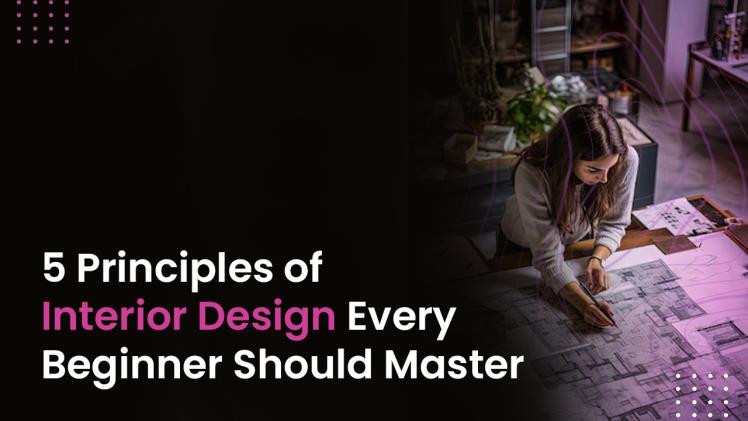5 Principles of Interior Design Every Beginner Should Master

Getting to implement modernity in every aspect of life is gaining popularity in recent decades. In line with the statement, the construction industry has its interior design element.
Are you someone planning to make your way into the fascinating interior design industry?
If yes, it is high time that you know about the top 5 principles of interior design as an engineer. Also, get to know about the interior design courses at the best institute for interior designing in Delhi and others.
TABLE OF CONTENTS:
|
What are the essential principles that every interior designing beginner should master?
Interior designing is an art that requires the artist to have a combination of skills and an understanding of certain principles to apply them at the right place at the right angle.
Here are the top 5 principles for beginner interior designers to learn in their education at interior design colleges in Delhi and others.
Balance:
Balance is one of the fundamental principles of interior design that declares the outcome of the design process.
There are three types of balance in interior design namely symmetrical, asymmetrical, and radial balance. Each type of balance has its characteristics as mentioned below.
| Type of Balance | Characteristics |
| Symmetrical Balance | Symmetrical balance involves arranging elements evenly around a central point, creating a mirror image. |
| Asymmetrical Balance | Asymmetrical balance involves distributing different elements throughout the space to achieve visual equilibrium without mirroring each other. |
| Radial Balance | Radial balance emanates from a central focal point outward, with elements arranged around it. |
Scale and Proportion:
While balance is the major element in interior design, scale and proportion stand as a backup for balance.
Scale refers to the size of objects with each other and the space they occupy. Proportion involves how these objects relate to each other and the space as a whole.
The property of scale and proportion is implemented in arranging the furniture, accessories, and architectural elements in the given space of interior design.
The best interior design courses in Delhi and others will train students in the fundamentals of scale and proportion maintenance.
Harmony and Unity:
Everything matters in interior design. The number of elements or aspects you add to the space.
Adding too much could clutter the appearance of the space while undermining the reduced inclusion of elements that will miss the required outcome of the space.
To achieve a proper cohesive look, harmony and unity are the key aspects. This can be achieved through color schemes, patterns, textures, and styles that complement each other. Consistency in design choices throughout the space helps to establish harmony and unity.
Rhythm and Repetition:
Rhythm and repetition is one of the key aspects that add a classy touch and appealing look to any design. As an interior designer learning at top design colleges in Delhi NCR and others, it is very important to understand the functioning of rhythm and repetition in the design process.
Rhythm creates visual interest and movement in a space. It can be achieved through the repetition of design elements such as colors, patterns, shapes, or textures. Alternating these elements creates a sense of rhythm, guiding the eye smoothly through the space.
Emphasis and Focal Points:
Every well-designed space needs a focal point to draw attention and create visual interest. This could be a fireplace, a piece of artwork, a statement piece of furniture, or an architectural feature.
By emphasizing the focal point and arranging other elements around it, you create a balanced and visually appealing composition.
Focal point emphasis is the statement design of the interior designer in the whole design outcome.
Getting to master all these five principles is mandatory for any beginner interior designer.
But, where and how to learn these interior design principles?
Take up the best interior design courses at the best institute for interior designing in Delhi and others to master the fundamental principles of interior design.
Range of interior design courses in India:
A wide range of interior design courses are offered at the best institute for interior designing in Delhi and others. Here is an insight into the different interior design courses from the diploma level to the postgraduate level.
| Course | Diploma in Interior Design | Bachelor of Interior Design | Master in Interior Design |
| Course Description | This course is designed with a motive to educate students on the basics of interior design.
In this course, the students are exposed to the basics of interior designing such as creating designs, choosing materials, etc. |
Bachelor of Interior Design course is designed to educate students about the technologies, methodologies, intricacies, and nuances in interior designing any constructional outlay.
This course inculcates the skills that are required to analyze, plan, and provide a perfect interior design masterpiece. |
Master in Interior Design course is a combination of interior designing facet and business management facet.
This course inculcates interior design education along with business establishment and management skills. |
| Level | Polytechnic level | Undergraduate level | Postgraduate level |
| Duration | 1 year | 3 years | 2 years |
| Eligibility Criteria |
Some colleges might require mathematics as a compulsory subject in 10+2. |
|
|
With this, all the essential details of interior design courses are covered for you to know.
Conclusion:
As a concluding point, every beginner interior designer at the best institute for interior designing in Delhi and others needs to learn the above-mentioned 5 essential principles in interior design.
FAQs:
- What are the skills required for interior design?
- Creativity
- Designing skills
- Drawing Skills
- Patience
- Time Management
What qualifications do I need for interior design?
The basic qualification expected to be an interior designer is professional education in interior design by pursuing any UG or PG course.
- Is interior design a good career option?
Yes, interior design is a good career option as the scope after interior design courses is huge as top companies hire interior designers for various roles such as interior designers, space designers, etc both in India and abroad.
- Does interior design have a future?
Yes, as the construction industry is raising standards, interior design being a facet of it has a great future in the upcoming years.
best institute for interior designing in delhi, “interior design colleges in delhi,
best interior design courses in delhi, design colleges in delhi ncr “




